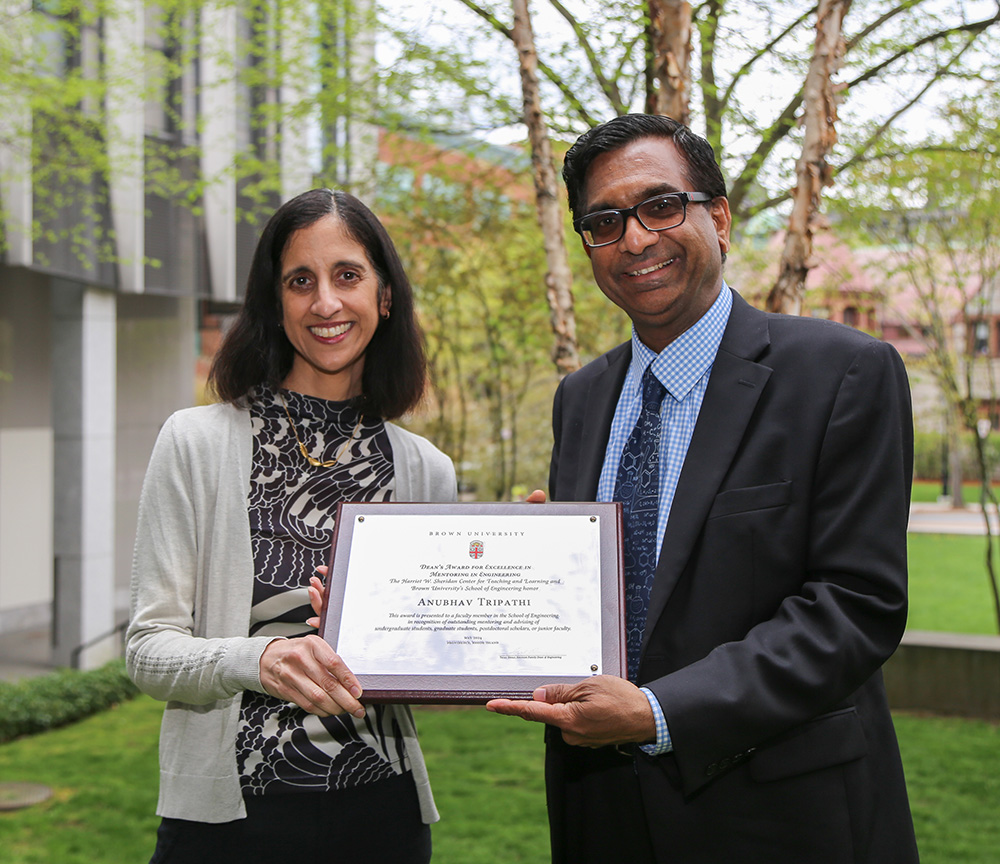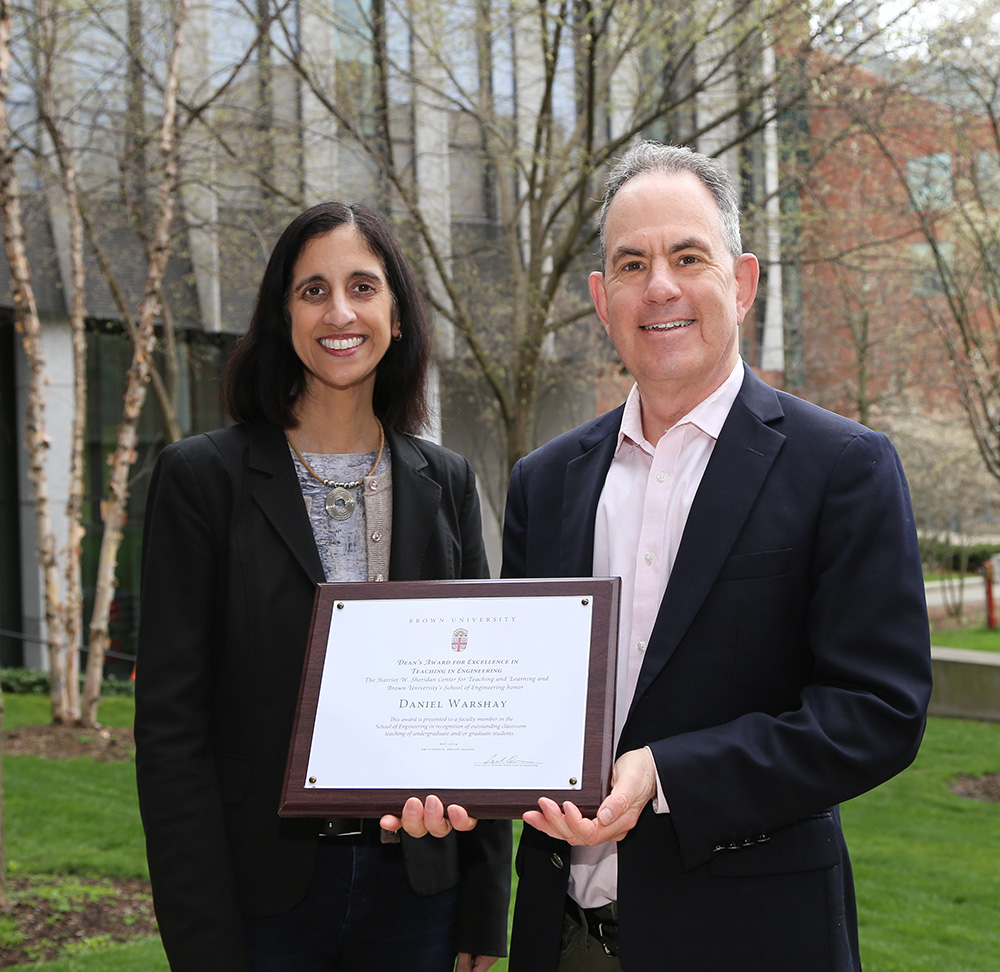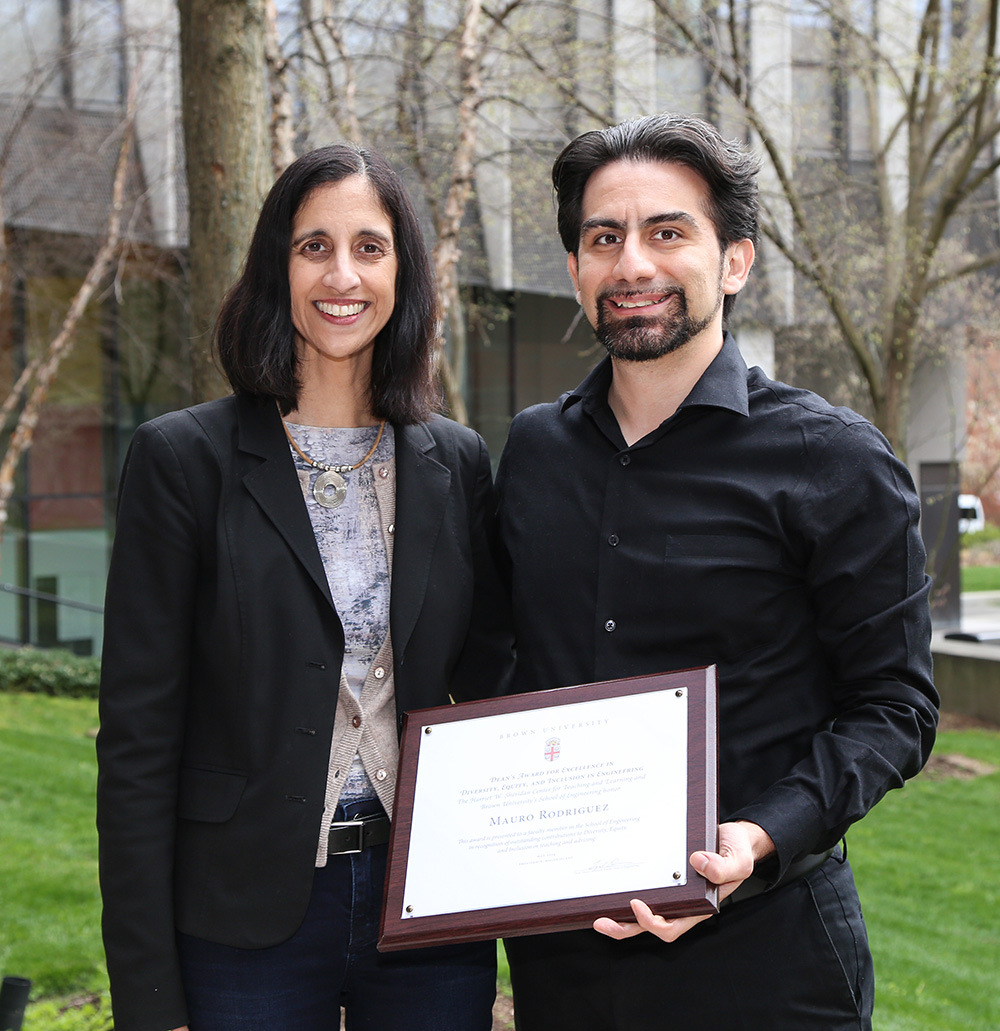School of Engineering Professor Anubhav Tripathi, Professor of the Practice Danny Warshay, and Assistant Professor Mauro Rodriguez were among those honored with Brown University’s awards in mentoring, teaching, and diversity, equity, and inclusion in the annual ceremony sponsored by the Harriet W. Sheridan Center for Teaching and Learning. Tripathi was honored with the Dean’s Award for Excellence in Mentoring in Engineering, while Warshay was presented with the Dean’s Award for Excellence in Teaching in Engineering. Rodriguez was presented with the DEI award, a recognition of efforts to create a more equitable, diverse, and welcoming place for teaching and advising.

Tripathi was described by multiple nominators as a passionate mentor, prepared to go above and beyond to be the finest supervisor available. His influence and support were noted, proving himself time and again as a scientific mentor through his actions and advocacy. He develops students, including undergraduates, into skilled technical scientists, while encouraging creativity and innovation. Several current and former students called the Tripathi Lab a window to the entire globe—both in terms of cultural and research diversity, as Tripathi is known for encouraging them to develop and optimize technologies to address medical diagnostic problems that may be neglected.
For example, Tripathi has become well known for his push into women’s health research in recent years, publishing numerous papers on new methods for non-invasive prenatal testing strategies, breast/cervical/ovarian cancer diagnostics, and more. He has a major interest in minority health and disparities research questions as well, such as understanding pre-eclampsia, HIV, and improving diagnostic technologies for low resource settings.
“I am a first-generation STEMinist from abroad who had no notion how to succeed in academia and get through a Ph.D. program. I was trained as a cell and tissue engineer; therefore, I had no experience with diagnostics when I joined his lab,” said a recent Ph.D. graduate of the Tripathi Lab. “Anubhav spent numerous weekend mornings in meetings with me, walking me through the science, helping me understand the need in the field, and most importantly, instilled in me the passion for translational research. He also gave me advice on how to succeed in a highly competitive sector like biomedical engineering and in higher education.”
Tripathi’s research group develops new pathogen diagnostic platforms by integrating biological and engineering principles. His group designs, creates and builds microfluidic devices to investigate clinical applications involving diagnosis of cancer and infectious diseases as well as protein structure, and basic questions regarding biological molecules. He holds many patents, has over 100 peer-reviewed publications, and has delivered more than 50 invited talks. He is a Fellow of the American Institute of Medical and Biological Engineering.

Warshay, who is also the Executive Director of the Jonathan M. Nelson Center for Entrepreneurship, was praised by students for his teaching of ENGN1010–The Entrepreneurial Process. Students emphasized three things about Warshay: First, his characteristic approach to entrepreneurship as a structured process for problem solving; Second, his empowering approach to teaching and dedication to the success of every student in his class; And third, his excellence as a mentor, and his genuine faith that every student can successfully embody the spirit of entrepreneurship if guided to do so.
Warshay began his entrepreneurial pursuits while an undergraduate at Brown as a member of the Clearview Software startup leadership team. Apple acquired Clearview in 1989, and since then, Warshay has co-founded and sold companies in fields ranging from software and advanced materials to consumer products and media (acquired by Medline, Time, Belo Corporation, Sealed Air, Penton Media). Since 2005, he has been teaching and leading workshops on entrepreneurship around the world. Brown’s Critical Review has recognized ENGN1010 as the highest rated course on campus several times.
Based on this course, Warshay wrote the award-winning book SEE SOLVE SCALE: How Anyone Can Turn an Unsolved Problem into a Breakthrough Success. The book highlights all his take-aways from teaching entrepreneurship to liberal arts students for over 18 years at Brown University and demystifies it into a simple 3 step process: validating a problem, identifying a small scale solution and scaling it into a long term solution.
“My phone untouched, laptop unopened, my attention was wholly captivated for the entire 1 hour and 20 minutes,” said a student from his spring course. “At 11:50, what felt like mere minutes had passed, and it dawned on me—Professor Warshay was extraordinary. Engaging every college student for 80 minutes straight is no small feat, and he accomplished it effortlessly.
“Professor Warshay shatters preconceptions, emphasizing that entrepreneurship is for everyone. Through compelling stories and images of his diverse former students tackling global issues, he reinforces the idea that entrepreneurship knows no boundaries of sex, race, or gender—it is a structured process for solving problems at scale.”

Rodriguez was honored for his leadership and impact in the nuSTEM program with the Dean’s Award for Impact in Diversity, Equity, and Inclusion in teaching and advising. After conceiving of the nuSTEM program as a way to bridge inequities in social capital for diverse graduate students and postdoctoral scholars in the School of Engineering in terms of workforce preparedness, he sought to provide visible career development opportunities to diverse talent with the hypothesis that this would be more effective than an implicit curriculum to develop as future faculty, professionals, or entrepreneurs. This approach is impactful in that it aims to prepare trainees regardless of their initial social capital and offers exposure to academic, industry, and entrepreneurial career paths rather than assuming a common path for all.
Through ongoing workshops and targeted seminars, Rodriguez has created a curriculum to educate graduate students and postdocs to ensure their career success (competitive skill sets to enter, succeed, and innovate in the workforce). In terms of impact, this program hosted 13 sessions this spring and 10 over the fall semester, with attendance of 10-35 students for each session, from engineering and across the STEM disciplines. His innovative curriculum is delivering much needed career content to our students, and also linking topics across the breadth of the program, with students creating Individual Development Plans and engaging in topics across three workforce career pathways (professoriate, STEM industries, and entrepreneurship).
Through his nuSTEM program, Rodriguez has not only advanced career skills, he has forged impactful collaborations with the National Center for Faculty Development, Center for the Integration of Research, Teaching and Learning (CIRTL), Sheridan Center, Biomed’s Office of Graduate and Postdoctoral Studies, Brown alumni, and industrial and academic leaders. His program has also promoted community, strengthened student and postdoc networks across STEM, engaged faculty, and enhanced the mentoring and support as a School.
Beyond the nuSTEM program, Rodriguez has served as research adviser for Brown’s Leadership Alliance Summer Research - Early Identification Program. He is a lifetime member of the Society of Professional Hispanic Engineers and serves as the faculty adviser for Brown’s chapter. He is also an integral part of STEMJazz (a community of STEM underrepresented faculty members).
The University’s Sheridan Award Ceremony took place on Wednesday, May 1.